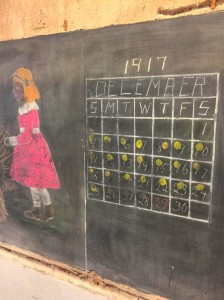Bullying is a serious issue in our society. It’s an issue that has garnered a lot of attention over the past few years. Legislation has been enacted by our governments. Schools have done extensive training for their staff and students and now have strict policies about bullying. Many, including McAuliffe, have anti-bullying clubs.
But, I don’t think I really understood how deeply ingrained bullying is in our culture until recently. In at least one respect, we celebrate it in song and if that’s not actual condoning of bullying it is at least passive acceptance. You doubt me? Please join me in song:
Rudolph the Red-Nosed Reindeer
Had a very shiny nose
And if you ever saw it
You would even say it glows
All of the other reindeer
Used to laugh and call him names
They never let poor Rudolph
Join in any reindeer games.
Think about that behaviour toward Rudolph...his “friends” laugh at him, call him names and exclude him from playing with them. That’s bullying and I can prove it.
Here’s the definition of bullying, according to the Massachusetts Department of Elementary and Secondary Education:
“The repeated use by one or more students [aggressor(s)] of a written, verbal or electronic expression or a physical act or gesture or any combination thereof, directed at a target that: (i) causes physical or emotional harm to the target or damage to the target's property; (ii) places the target in reasonable fear of harm to him/herself or of damage to his/her property; (iii) creates a hostile environment at school for the target; (iv) infringes on the rights of the target at school; or (v) materially and substantially disrupts the education process or the orderly operation of a school. For the purposes of requirements related to this law, bullying shall include cyber-bullying. See section 5 of the legislation for more details on the definition of cyber-bullying and more.”
See what I mean? Rudolph’s peers have created “a hostile environment at school for the target.”
It’s enlightening to see how deeply ingrained the passive acceptance of bullying is in our society.
This may seem like a silly observation about a popular holiday song, and I certainly don’t want anyone to think I’m minimizing the seriousness of bullying -
I was bullied in middle school and I’m still pretty mad about it.
In 7th grade, Brian Doe (not his real name) was in my math class and one day he threatened to beat me up if I did not hand over my lunch money. He was bigger, stronger and much more aggressive than I was, so I meekly handed him my money and went hungry. This went on for about two weeks.
Finally, I decided I was not going to do this anymore. I felt ashamed that I was afraid of him and I'd let him take advantage of me. One day, I screwed up my courage and said “No.” I refused to hand over my lunch money. I was prepared for the consequences but I could not go on giving in to him anymore. It just made me feel so bad about myself.
I was fortunate. He did not beat me up. He just stopped asking. I stood up to him and it felt good. I guess if he had not stopped bullying me or if he had beaten me up, I would have gone to one of my teachers but that was my last resort.
McAuliffe is a very different place than was my school. We work really hard as a community to ensure that students don’t bully other students. We strive to create a supportive, safe community here where bullying doesn’t happen - but we have to be prepared if it does.
Students should always feel safe to bring any form of bullying to the attention of any of the adults at school. Standing up for yourself is great, but not everyone can do it and it doesn't always solve the problem.
There is nothing wrong with asking for help.
We all need a little help sometimes...and, apparently, that even includes Rudolph.
We all need a little help sometimes...and, apparently, that even includes Rudolph.







